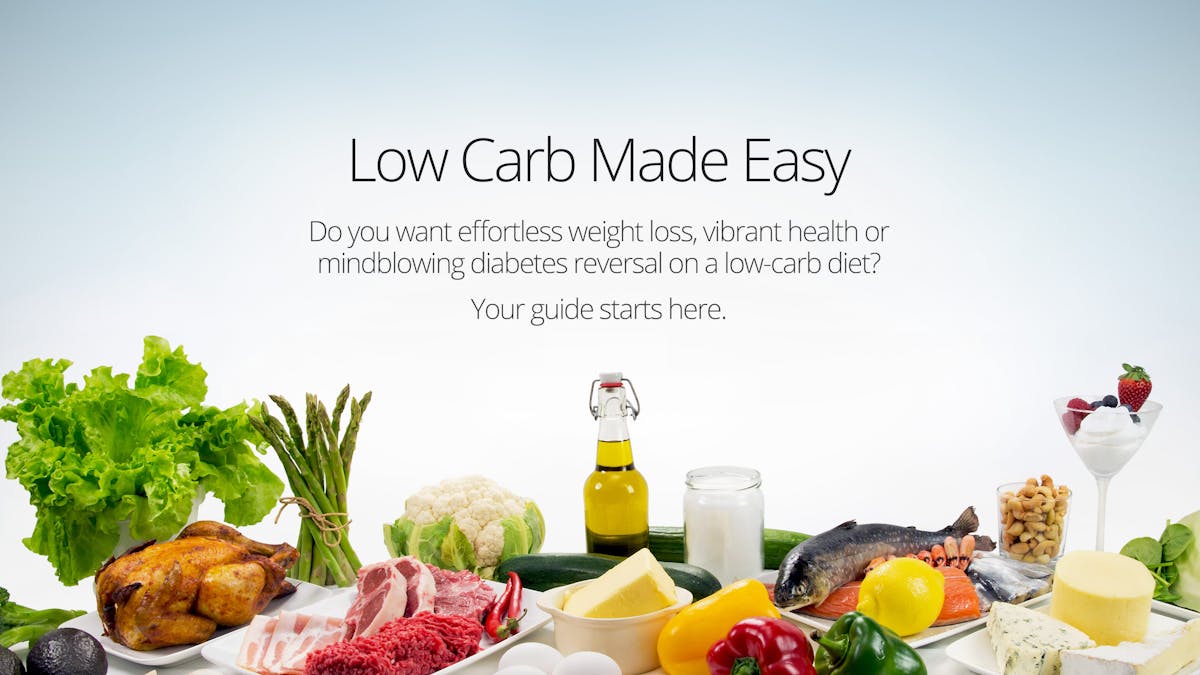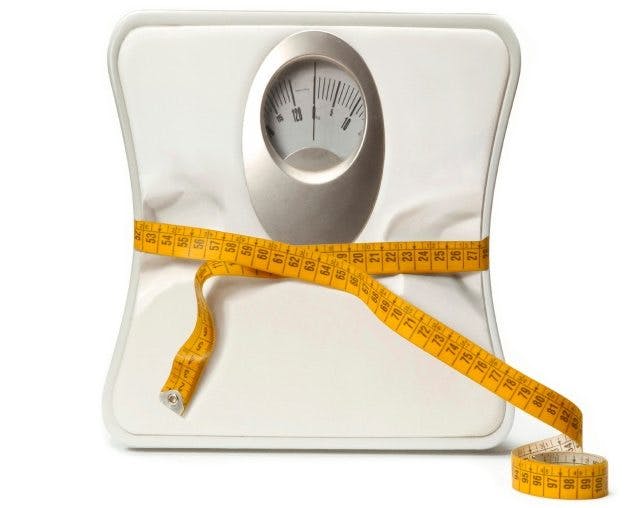
Introduction
A low-carb diet means you eat fewer carbohydrates and a higher proportion of fat. Most importantly you minimize your intake of sugar and starches. You can eat other delicious foods until you are satisfied – and still lose weight.
The Basics
- Eat: Meat, fish, eggs, vegetables growing above ground and natural fats (like butter).
- Avoid: Sugar and starchy foods (like bread, pasta, rice, beans and potatoes).
Eat when you’re hungry until you are satisfied. It’s that simple.
You do not need to count calories or weigh your food. And just forget about industrially produced low-fat products.
The Science
A number of recent high-quality scientific studies shows that such a Low-Carb High-Fat (LCHF) diet makes it easier both to lose weight and to control your blood sugar. And that’s just the beginning.
There are solid scientific reasons why LCHF works. When you avoid sugar and starches your blood sugar stabilizes and the levels of insulin, the fat-storing hormone, drop. This increases fat burning and makes you feel more satiated.
The Science of Low Carb
This page summarizes some of the science behind low-carb diets.
Bottom line
The latest review of all major trials of low carb diets show improved weight AND improvement of all major risk factors for heart disease:
- Santos FL, et al. Systematic review and meta-analysis of clinical trials of the effects of low carbohydrate diets on cardiovascular risk factors. Obes Rev. 2012 Aug 21. doi: 10.1111/j.1467-789X.2012.01021.x. [Epub ahead of print]
Saturated fat
Despite half a century of research there is still no evidence that natural saturated fat (like butter, eggs etc.) is anything but completely safe to eat.
Have a look at these recent reviews of all the evidence:
Insufficient evidence of association is present for intake of … saturated or polyunsaturated fatty acids; total fat … meat, eggs and milk.
- Mente A, et al. A systematic review of the evidence supporting a causal link between dietary factors and coronary heart disease. Arch Intern Med. 2009 Apr 13;169(7):659-69.
There were no clear effects of dietary fat changes on total mortality or cardiovascular mortality…
- Hooper L, et al. Reduced or modified dietary fat for preventing cardiovascular disease. Cochrane Database Syst Rev. 2011 Jul 6;(7):CD002137.
…no significant evidence for concluding that dietary saturated fat is associated with an increased risk of CHD or CVD.
- Siri-Tarino PW, et al. Meta-analysis of prospective cohort studies evaluating the association of saturated fat with cardiovascular disease. Am J Clin Nutr. 2010 Mar;91(3):535-46.
But wait, what about butter and other high fat dairy specifically? Well, actually people consuming it are if anything thinner and healthier than others:
The observational evidence does not support the hypothesis that dairy fat or high-fat dairy foods contribute to obesity or cardiometabolic risk…
- Kratz M, et al. The relationship between high-fat dairy consumption and obesity, cardiovascular, and metabolic disease. European Journal of Nutrition, Online First™, 18 July 2012
This means that the scientific foundation of the low fat dietary advice has fallen. The reasons for it today are mainly economical (low fat high sugar products are very lucrative and finances a lot of lobbying), combined with old-fashioned prestige and inertia.
The low fat dietary advice has become a house of cards with nothing to support it. It is just a question of time before it’s apparent to everybody.
Weight loss
Some people still claim that weight loss studies do not show any advantage for low carb diets. Unbelievably enough, that is what many so called experts still believe.
It’s either ignorance or science denial.
There are at least 18 modern scientific studies of the highest quality (RCT) that show significantly better weight loss with low carb diets:
RCTs showing significantly more weight loss with low carb diets
- Shai I, et al. Weight loss with a low-carbohydrate, mediterranean, or low-fat diet. N Engl J Med 2008;359(3);229–41.
- Gardner CD, et al. Comparison of the Atkins, Zone, Ornish, and learn Diets for Change in Weight and Related Risk Factors Among Overweight Premenopausal Women. The a to z Weight Loss Study: A Randomized Trial. JAMA. 2007;297:969–977.
- Brehm BJ, et al. A Randomized Trial Comparing a Very Low Carbohydrate Diet and a Calorie-Restricted Low Fat Diet on Body Weight and Cardiovascular Risk Factors in Healthy Women. J Clin Endocrinol Metab 2003;88:1617–1623.
- Samaha FF, et al. A Low-Carbohydrate as Compared with a Low-Fat Diet in Severe Obesity. N Engl J Med 2003;348:2074–81.
- Sondike SB, et al. Effects of a low-carbohydrate diet on weight loss and cardiovascular risk factor in overweight adolescents. J Pediatr. 2003 Mar;142(3):253–8.
- Aude YW, et al. The National Cholesterol Education Program Diet vs a Diet Lower in Carbohydrates and Higher in Protein and Monounsaturated Fat. A Randomized Trial. Arch Intern Med. 2004;164:2141–2146.
- Volek JS, et al. Comparison of energy-restricted very low-carbohydrate and low-fat diets on weight loss and body composition in overweight men and women. Nutrition & Metabolism 2004, 1:13.
- Yancy WS Jr, et al. A Low-Carbohydrate, Ketogenic Diet versus a Low-Fat Diet To Treat Obesity and Hyperlipidemia. A Randomized, Controlled Trial. Ann Intern Med. 2004;140:769–777.
- Nichols-Richardsson SM, et al. Perceived Hunger Is Lower and Weight Loss Is Greater in Overweight Premenopausal Women Consuming a Low-Carbohydrate/High- Protein vs High-Carbohydrate/Low-Fat Diet. J Am Diet Assoc. 2005;105:1433–1437.
- Krebs NF, et al. Efficacy and Safety of a High Protein, Low Carbohydrate Diet for Weight Loss in Severely Obese Adolescents. J Pediatr 2010;157:252-8.
- Summer SS, et al. Adiponectin Changes in Relation to the Macronutrient Composition of a Weight-Loss Diet. Obesity (Silver Spring). 2011 Mar 31. [Epub ahead of print]
- Halyburton AK, et al. Low- and high-carbohydrate weight-loss diets have similar effects on mood but not cognitive performance. Am J Clin Nutr 2007;86:580–7.
- Dyson PA, et al. A low-carbohydrate diet is more effective in reducing body weight than healthy eating in both diabetic and non-diabetic subjects. Diabet Med. 2007 Dec;24(12):1430-5.
- Keogh JB, et al. Effects of weight loss from a very-low-carbohydrate diet on endothelial function and markers of cardiovascular disease risk in subjects with abdominal obesity. Am J Clin Nutr 2008;87:567–76.
- Volek JS, et al. Carbohydrate Restriction has a More Favorable Impact on the Metabolic Syndrome than a Low Fat Diet. Lipids 2009;44:297–309.
- Partsalaki I, et al. Metabolic impact of a ketogenic diet compared to a hypocaloric diet in obese children and adolescents. J Pediatr Endocrinol Metab. 2012;25(7-8):697-704.
- Daly ME, et al. Short-term effects of severe dietary carbohydrate-restriction advice in Type 2 diabetes–a randomized controlled trial. Diabet Med. 2006 Jan;23(1):15–20.
- Westman EC, et al. The effect of a low-carbohydrate, ketogenic diet versus a low- glycemic index diet on glycemic control in type 2 diabetes mellitus. Nutr. Metab (Lond.)2008 Dec 19;5:36.
The first 16 studies in the list are weight loss trials, the last two are studies on type 2-diabetics (usually overweight) showing the same effect. Many of the studies are of six months or one year duration, one of them (Shai et al) is two years long.
All of these studies show significantly more weight loss for the group that were advised to eat a low carb diet (Atkins, in most cases).
As far as I know the opposite has never been shown: low carb has never lost a weight loss trial significantly. This means that low carb is winning versus the failed low fat/low calorie advice by 18-0!
Source: http://www.dietdoctor.com/low-carb/science



No comments:
Post a Comment